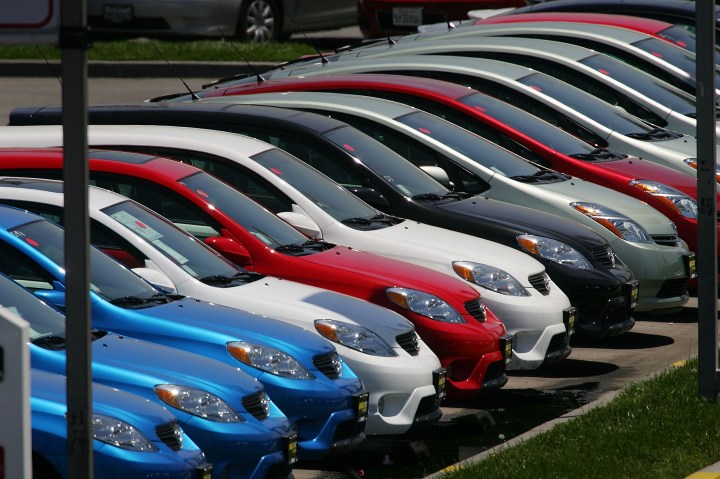
How do carmakers set the “manufacturer’s suggested retail price”?
Share Now on:
How do carmakers set the “manufacturer’s suggested retail price”?

This is just one of the stories from our “I’ve Always Wondered” series, where we tackle all of your questions about the world of business, no matter how big or small. Ever wondered if recycling is worth it? Or how store brands stack up against name brands? Check out more from the series here.
Listener John Davis asks:
I purchased a vehicle and I wonder whether the MSRP really has some meaning, or is it a random valuation assigned by the manufacturer?
Everyone who’s ever stepped foot on a car lot knows that each vehicle comes with a sticker price — an amount you may or may not end up paying.
But even though you can usually negotiate the price, experts say that the number pasted on a window of the vehicle, the “manufacturer’s suggested retail price,” isn’t random. Rather, it’s a way for manufacturers to communicate the value of their offering.
“A suggested retail price is based on an assessment by the manufacturer of what they think the worth of this product is to their customers,” said Gerald Smith, a marketing professor at Boston College.
Within that suggested retail price, you also have to leave some room for the manufacturer’s and dealer’s margins, along with potential sales promotions, said Z. John Zhang, a marketing professor at the Wharton School.
But even though retailers can offer discounts, experts say the MSRP helps manufacturers prevent the price of a car from getting too low.
Protecting the brand
When we’re buying products, we typically go to retailers, so manufacturers don’t set the end price for consumers, explained Lan Xia, a marketing professor at Bentley University.
“MSRP is one way that they can exert their influence on the final price,” Xia said.
That final price helps to define the image of their brand, she said.
If a retailer is heavily discounting the product and selling it cheap, that’ll affect how consumers perceive the manufacturer, Xia explained. Research shows that people sometimes think lower prices are a sign of poor quality.
An MSRP can be helpful, but shop around
An MSRP can help if a consumer is particularly uncertain about the normal pricing for a product. Xia explained that consumers react to price comparisons and deviations, so a product’s MSRP is a reference point, another piece of knowledge, they can use when considering purchases.
Zhang noted that consumers will also feel good about buying the product if they get to pay less than the sticker price.
“They will tell people, ‘This car is actually worth $65,000 — I only paid $60,000,’” Zhang said.
Xia said MSRPs don’t tell us everything we should know about the market for that product. She said if you go to the store and a product is $4, but the retailer is giving you a dollar off, that $3 price might be appealing. But the store next door might be selling it for $2.
Same logic applies to cars. Visiting other dealerships or checking other reference prices will give you a better sense of which deal is fairest, Xia said.
How the pandemic changed what people pay
In recent years, many car buyers have paid more than the MSRP because high demand and low inventory meant less room to negotiate, Marketplace reported.
Last year, the average transaction price of a vehicle was almost $1,000 higher than the suggested retail price, according to data from Kelley Blue Book.
A 2022 report from the research company GfK AutoMobility found that in May and June, 80% of car buyers paid the MSRP or above. GfK called this “a startling contrast to the industry’s long-standing tradition of significant discounts.”
Consumers were not happy. Almost a third of buyers who paid more than the MSRP said they would advise others not to use the dealership they went to, and more than a quarter said they would not buy the same brand again.
But there are signs that consumers are gaining some of their power back. Rebecca Rydzewski, a research business manager with Cox Automotive, told Marketplace that dealers have less power now that automakers are producing more vehicles, thanks to the easing of the semiconductor shortage.
KBB said that in March, the average sale was about $170 lower than the sticker price.
That was the first time in roughly two years that the typical customer didn’t have to pay full price.
There’s a lot happening in the world. Through it all, Marketplace is here for you.
You rely on Marketplace to break down the world’s events and tell you how it affects you in a fact-based, approachable way. We rely on your financial support to keep making that possible.
Your donation today powers the independent journalism that you rely on. For just $5/month, you can help sustain Marketplace so we can keep reporting on the things that matter to you.


















